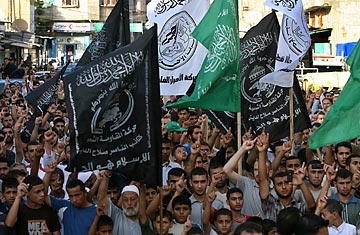
Hamas supporters demonstrate in the Gaza Strip refugee camp of Jabalia against Israeli policement at the al-Aqsa Mosque compound, Islam's third holiest site, on Sept. 27, 2009
On Sunday, as Israel prepared for the Jewish holiday of Yom Kippur, clashes erupted between Palestinians and Israeli security at the al-Haram al-Sharif compound, which houses the holy al-Aqsa Mosque, in East Jerusalem, reportedly after "immodestly dressed" tourists entered the compound, the third holiest site in Islam. The outrage had repercussions in the Gaza Strip, where the Islamist Hamas government called for fresh demonstrations against Israel.
The incident is the latest of many ominous signs for a peace process that is already on the rocks. On the same holiday in 2000, a highly controversial visit paid to the mosque by then opposition leader Ariel Sharon proved to be the move that many here say launched the second intifadeh. Indeed, it was a bad weekend for the Israeli-Palestinian conflict all around. On Sept. 25, the Israeli Defense Forces killed three members of the Palestinian militant group Islamic Jihad in an air strike — the first one inside densely populated Gaza City since a loose cease-fire was implemented following Israel's devastating three-week offensive in January. Some warn that the cease-fire is looking increasingly shaky.
"We've had a number of months now of a cessation of rocket fire, proactive action by the government here in Gaza to stop the rocket fire. And yet we have no positive development in terms of the siege and other actions that have been taken, which are crippling the whole society here," John Ging, head of the U.N. Relief and Works Agency in Gaza, told TIME on Sunday. "It's a tinderbox, this place, ready to explode at any time." After a cross-border attack on the recent Jewish holiday of Rosh Hashanah, the Israeli army released a statement warning that it would "respond harshly to any attempt to break the calm in Israel's southern communities."
Friday's air strike came shortly after the region watched a tense handshake unfold 5,000 miles away in New York City with Palestinian Authority President Mahmoud Abbas, leader of Fatah, which controls the West Bank, and Israeli Prime Minister Benjamin Netanyahu. U.S.-led attempts at jump-starting the Israeli-Palestinian peace process in recent months have failed, in large part because of Israel's refusal to freeze construction of Jewish settlements in the West Bank. Egyptian-mediated talks aimed at reconciling rivals Fatah and Hamas have yet to see a breakthrough as well.
"The Palestinians are weak; they are divided. And the Israelis are exploiting this situation," says Talal Okal, a political scientist at Gaza's Al-Azhar University. "I think the Israelis are waiting. They are provoking the Palestinians. They are waiting for rockets. They are trying to escape the American and European pressure on them to freeze the settlements. So this is a way to escape that pressure, at least for a while."
After some bellicose rhetoric following the Jerusalem clashes, Hamas, which rules the Gaza Strip but is labeled a terrorist organization by the U.S. and E.U., said it is committed to the cease-fire. "After the last war in January, the military wings in the Palestinian factions decided on their own to stop launching rockets, to push the Israeli side to stop their military activities against our people," Taher al-Nounou, a Hamas government spokesman, told TIME. "And I think it's a good policy." But al-Nounou warned that rocket fire from Gaza remains a legitimate response to Israeli offensive action, citing that as justification for a recent rocket attack by fellow Islamist group Islamic Jihad. "If the Israelis stop all their attacks, there will be no rockets from [Islamic] Jihad and the other big movements," al-Nounou said. Islamic Jihad and other Islamist groups are believed to be behind almost all of the rocket attacks since the cease-fire came into effect. Though there is some suspicion that Hamas may have had a hand in one or two, it has not claimed responsibility for any post-cease-fire rockets launched into Israel.
A recent U.N. report estimates that 1,387 civilians lost their lives, and much of the Gaza Strip's infrastructure was destroyed, in Israel's January invasion. The government and aid groups have been unable to rebuild because of an Israeli blockade that bars the import of cement and other building materials. The U.N.'s Ging says it was local frustration with the blockade — now in place for more than two years — that led to the spike in Hamas rocket fire, which in turn sparked Israeli bombardment in late December 2008 and invading troops on Jan. 4. Now, he warns, it's only a matter of time before it happens again. "If you do the same thing, in the same way, you're going to get the same result," he says. "We need to break this cycle and we need to do it urgently, otherwise we will have another explosion of violence. What day or when, I don't know. But I know it's coming."
Other analysts say there is too much at stake for that to happen anytime soon, but that the risk is real. "The cease-fire will likely hold — imperfectly — because the alternatives are worse," says Aaron Miller, a former adviser to six U.S. Secretaries of State on Arab-Israeli affairs and a public-policy fellow at a Washington think tank. "Hamas achieved gains — propaganda; largely the leadership survived; and they still control Gaza. The Israelis got an end to high-trajectory rocket fire into Israel. If either of those objectives are undermined, then things could start up again."
Indeed, it took less than a month for the last truce to fail. It remains to be seen just where the breaking point lies for the current one.
